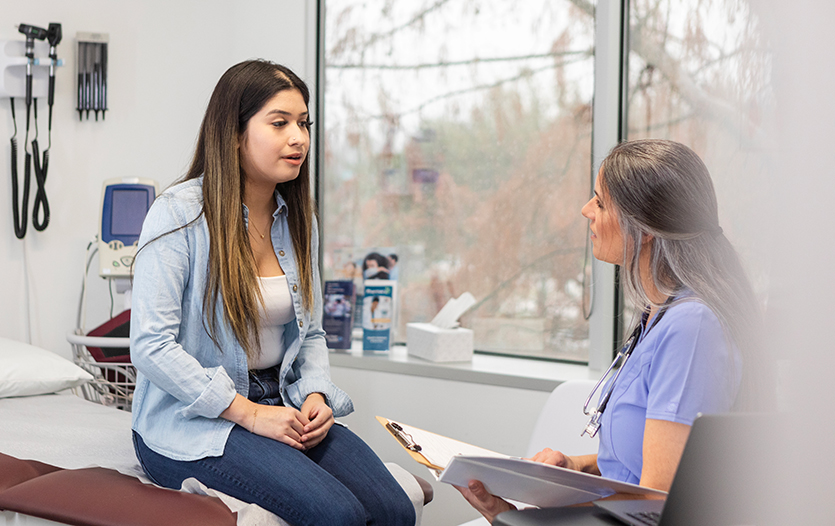
The team of experts at the Parkview Women’s & Children’s Hospital want expecting mothers to know that proper prenatal care can be a huge differentiator for the health of a newborn. They also recognize that it’s often complicated, depending on a woman’s access to trusted information and resources. Here, they outline the biggest benefits and expectations for a successful partnership between providers and pregnant patients.
Prenatal care consists of check-ups and testing throughout the course of a pregnancy to ensure that both mother and baby are doing well. Patients can see several different types of providers during this time, including OB/GYNs, certified nurse-midwives and some Primary Care physicians. It really depends on the mother’s preference. Note that pregnancy resource centers in the community do offer pregnancy testing and ultrasounds, but do not replace regular visits and testing with a provider. While these ultrasounds can offer an opportunity for bonding, they are very limited in scope and are not considered prenatal care.
Ideally, prenatal care begins in the first trimester. Visits are scheduled once a month in the beginning and become more frequent as the pregnancy progresses. A variety of factors can cause a delay in prenatal care, including a lack of insurance, transportation barriers and simply not knowing what an expecting mother needs to do. While these factors can feel overwhelming to a pregnant person, providers and their teams address them every day. They can often resolve barriers to care quickly and easily. If you are experiencing any hurdles in your prenatal journey, please call a provider to help get you started.
The benefits of proper prenatal care
Receiving early and regular prenatal care is one of the most important pieces to ensure a healthy pregnancy and delivery. The benefits are abundant, but here are some of the most impactful ways seeing a provider can support your growing family.
Sharing. The exchange of information is a two-way street. Your provider will offer all kinds of valuable information to you, such as the calculation for your due date, how much weight you should gain and what to expect as the pregnancy progresses. You’ll also share insights with your provider. It’s important for your care team to know about your health history and any prior pregnancy complications. Expecting mothers should share openly, even about sensitive topics like substance use, domestic violence, and any struggles you might be having with housing, transportation or access to healthy foods. These things all affect both your health and your baby’s.
Safety. During prenatal visits, you’ll learn how to keep both you and your baby safe. Your provider will review what medications are OK to take, how to identify danger signs and what diet to follow, including what foods to avoid. You’ll learn how to safely manage uncomfortable symptoms. Your provider will also routinely monitor a variety of metrics, like your blood pressure, weight and baby’s growth to make sure things are on track. Labs are drawn to determine if you’re at risk for complications such as diabetes, and ultrasounds are conducted to make sure the baby is developing appropriately.
Individualization. At the beginning of your pregnancy, your provider will take a detailed health history and perform a physical examination. These results are used to develop a plan of care specific to you. When care begins early in the pregnancy, existing risks can be identified and addressed promptly. It’s also important for care to be ongoing, as sometimes risks only become apparent as the pregnancy progresses. While you may learn a lot reading books or even taking classes, there is no substitute for individualized care focused specifically on your unique needs.
Resources. Your care team will likely be able to help connect you to resources in the community. For example, you may receive a referral to a pregnancy home visiting service. Your provider’s office can also direct you to organizations that offer free or discounted baby supplies, safe sleep classes, doulas and breastfeeding support.
Reassurance. If you talk to ten mothers and nine tell you a positive story and one tells you a negative one, which are you more likely to remember? For most of us, it’s easy to focus on what can go wrong. A prenatal care provider’s job is to monitor you and baby to make sure everything is OK. And most of the time, it is! The changes that go along with pregnancy can be overwhelming. It feels good to know that everything is normal.
Rapport. Pregnancy is a special and intimate time in a person’s life. You’ll be sharing information that is usually kept private and perhaps feel vulnerable. Beginning prenatal care early in the pregnancy and keeping regular visits is a good way to build rapport and develop a relationship with your care team. No one ever wants to feel like “just a number.” Having the opportunity to get to know each other better helps build trust and may help you feel more comfortable.
When should I begin prenatal care?
The answer might surprise you. If you think you may be pregnant, you should call and schedule an appointment now. If you aren’t pregnant but think you may want to have a baby in the future, you should also call and schedule an appointment. Having a discussion with your provider on pre-conception planning is always a good idea. You’ll be able to ensure chronic health issues are managed, make sure your immunizations are up to date, and talk about healthy lifestyle changes, like quitting tobacco. It will also allow you to start getting to know your provider and make sure that they are a good fit. You’ll be able to talk about your plan for growing your family and feel confident that you will be well supported when the time is right.
To connect with a prenatal care provider, call 877-PPG-TODAY or 877-774-8632.




